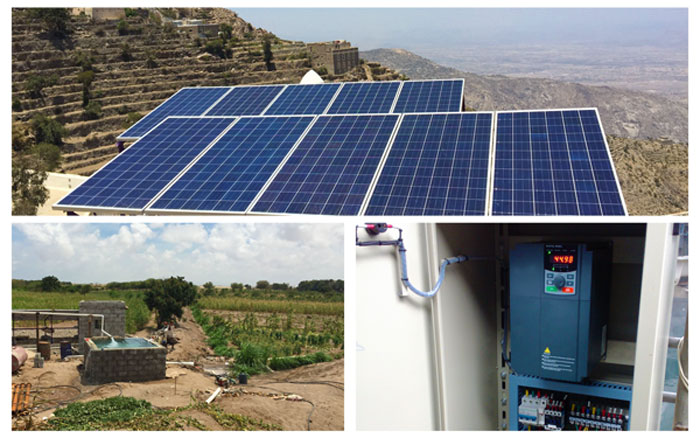By Newsroom Panama
Copyright newsroompanama

The world values water as a commodity, and the provision of water has never been a smooth task, especially in rural and agricultural areas.
Have you ever wondered how some communities and farms can pump water and not be so dependent on old-fashioned electricity or even expensive generators on diesel?
The Solar Pump Inverter conceals the solution. Since it has proved a game-changer in making the water available, and available, to irrigate, feed, and support the daily use of the water, this technology has been found to have become a game-changer and has become cost-effective, sustainable, and reliable.
The paper will describe the operation of a solar pump inverter, its advantages, applications, and why it is rapidly becoming the answer for the majority when it comes to using a modern water system.
What Is a Solar Pump Inverter?
A Solar Pump Inverter is a machinery, which turns direct current (DC) power produced by the solar panels into alternating current (AC) or the desired amount of power needed to operate a water pump.
In contrast to standard systems that do not use any more energy besides electricity supplied by the grid or fuel-powered generators, a solar pump inverter enables pumps to work with direct solar energy.
Not only does it make the pump work, but the flow of energy is also cleverly regulated such that the pump will run smoothly even when the tone of the sunlight varies with the time of day. This makes it particularly applicable to areas that are subject to changing amounts of sunlight.
Using Solar Pump Inverters in Daily Life
The use of solar pump inverters is also being integrated into normal practices, particularly in rural and agricultural societies. They can be used to operate irrigation systems directly using solar power by farmers without necessarily having to wait until there is some grid power or reliance on expensive fuel.
They are used by households in remote areas to draw water to drink, cook, and clean, thus making life easier even without the regular supply of electricity. They are also applicable in community water projects, and they assist in ensuring that the villages have a stable and environmentally friendly water supply.
Using solar pump inverters in everyday activities, individuals not only cause cost savings but also minimize the environmental impact and have access to water that is more predictable.
How Does a Solar Pump Inverter Work?
Solar Panels Capture Energy: This will be a set of solar panels that will change the sunlight into DC power, and they will be placed within the district of the pump position.
Conversion by the Inverter: This is a DC power that the solar pump inverter reflects and converts to either AC or any other type of usable energy, depending on the requirements of the pump.
Pump Operation: Converted power is used to drive the water pump that raises or violently pushes wells, rivers, or reservoirs.
Smart Control: The new state-of-the-art inverters also have the maximum power point tracking (MPPT) technology, i.e., the pump will be operating at its optimum efficiency regardless of the varying sun conditions.
The solar pump inverters are efficient and reliable energy consumers due to the efficient conversion and control that is realized by this intelligent conversion and control.
The main Advantages of a Solar Pump Inverter
1. Dependable Water Services in the Remote Areas
Many rural populations and farmlands are not close to power grids. Solar pump inverter empowers the pumping of water directly using solar energy, and this implies that the ability to irrigate the fields will be made possible, or even the ability to get drinking water without necessarily having to use the costly infrastructure.
2. Lower Operating Costs
Solar pump inverters have low operating costs as compared to diesel generators, which need fuel and maintenance at all times. When installed, they will use free sunlight only, and this saves massive expenses in the long run.
3. Environmentally Friendly
Greenhouse gas emissions are minimized by solar pump inverters, which substitute fossil fuel-powered systems. They sustainably promote agriculture and reduce pollution in agricultural societies.
4. Easy Maintenance and Long Life
Solar pump inverters are robust and do not demand a lot of maintenance because they have fewer moving parts and have more sophisticated protection features (dry-run protection and voltage control).
5. Adaptability
The solar inverters designed to operate solar pumps can be applied to operate in various types of pumps, which include centrifugal pumps, submersible pumps, and surface pumps, hence suitable for many water applications.
Everyday Applications of Solar Pump Inverters
The solar pump inverters are universal and can be applied in numerous situations:
Agriculture and Irrigation
They are applied by farmers in pumping water, which is applied to irrigate crops even during seasons that are dry seasons. They do not involve the expensive use of diesel pumps, and this allows the farmers to utilize the saved money in crop production.
Livestock Water Supply
Solar pump inverters are used in remote locations that require a constant supply of water for animals, such as troughs and tanks.
Community Water Systems
Solar pump inverters may be applied to supply water to households, schools, and other structures in villages and small towns without access to electricity.
Industrial and Commercial Use
They also find use in fisheries and mining activities, as well as other industries that have to engage in constant pumping, yet would wish to reduce the cost of energy.
Features to Look for in a Solar Pump Inverter
When choosing a solar pump inverter, one should pay attention to such features that can guarantee efficiency and durability:
MPPT Technology: Using solar panels to the maximum.
Dry-Run Protection: It is used to ensure that the pump is not destroyed by low water levels.
Soft Start Feature: Lessens the strain on the pump motor at startup.
Compatibility: Can be used with submersible and surface pumps.
Monitoring: There are options for remote monitoring of the performance of the pump and the use of solar energy.
The characteristics of the inverter are smarter, safer, and more reliable.
Why Choosing a Solar Pump Inverter Is the Right Move
A solar pump inverter is not merely an energy system; it is the revolution that is enabling farmers to have a regular and constant supply of water, even in industries, entire communities whose existence depends on water.
Unlike conventional systems, which rely on diesel and unreliable state grids, which are costly, a solar pump inverter is an environmentally friendly and cost-effective alternative to ensure one has an uninterrupted water supply.
The farmers can irrigate their land without worrying about their fuel being rationed or having to pay more for electricity, and industries and communities can continue to operate without stalling.
Other than saving money in the short run, the solar pump inverter is a long-term sustainability investment. It gets rid of carbon emissions, discourages the consumption of fossil fuels, and helps to make the world transition to cleaner energy sources.
Both low maintenance and high efficiency, Gyser Solar Pump Inverter can create a smoother flow of water and a cleaner environment.
The Future of Solar Pump Inverters
Inverters on solar pumps are bound to continue playing a critical role in the sustainable management of water, with the cost of solar energy coming down and becoming more efficient.
Smart controls, AI forecasting, and hybrid models will be applied in the future to make a model more reliable. In addition to cutting down on expenses and fuel reliance, they will guarantee the availability of constant water, as well as clean energy.
Final Summary
The world is changing the way water is pumped and supplied using a Solar Pump Inverter. It can help supply water reliably, reduce expenses, enhance sustainable practices, and empower rural and urban populations due to the transformation of solar energy into the correct form that can be used by the pumps.
In agriculture, solar pump inverters will guarantee water continues to flow without relying on unpredictable or costly sources of energy. As technology keeps improving at a high rate, this solution will continue to be the core of smarter, cleaner water management in the future.



